Did you know the global organic food market is set to hit $600 billion by 2027? This huge growth shows more people want healthier, sustainable food. As we all focus more on health, organic foods are becoming more popular. But what makes them better for you?
In this guide, we’ll look at the many benefits of eating organic. You’ll learn about strict standards, environmental perks, and nutritional gains. Discover why choosing organic is a smart move for your health.
Key Takeaways
- The global organic food market is expected to reach $600 billion by 2027, reflecting the growing demand for healthier, more sustainable food options.
- Organic foods are produced without the use of synthetic pesticides, fertilizers, and genetically modified organisms (GMOs), making them a healthier choice for consumers.
- Organic farming practices promote environmental sustainability by reducing greenhouse gas emissions, conserving natural resources, and supporting biodiversity.
- Organic foods often contain higher levels of essential nutrients, antioxidants, and minerals compared to conventionally grown produce.
- Choosing organic foods can help reduce your exposure to harmful chemicals and support your overall immune system function.
Understanding What Makes Food Truly Organic
In today’s world, picking the right food can be hard. The term “organic” is everywhere, but what does it really mean? It’s important to know the strict rules and checks that make organic food different from regular food.
Organic Certification Standards and Requirements
The USDA runs the National Organic Program. It sets rules for organic food. Farms and producers must follow these rules to get the organic seal. They can’t use synthetic fertilizers or pesticides.
They also have to keep detailed records and pass regular checks. This makes sure they follow the rules.
The Difference Between Natural and Organic Labels
“Natural” and “organic” labels are not the same. “Natural” means a product doesn’t have artificial stuff in it. But it doesn’t mean it was made organically.
The organic seal means a product was made the right way. It means it’s free from non-GMO products, chemical-free crops, and pesticide-free produce.
| Criteria | Natural | Organic |
|---|---|---|
| Synthetic Fertilizers | Allowed | Prohibited |
| Synthetic Pesticides | Allowed | Prohibited |
| Genetic Modification | Allowed | Prohibited |
| Certification | No Certification Required | USDA Organic Certification Required |
“Organic food is produced without synthetic pesticides, fertilizers, sewage sludge, genetically modified organisms, or ionizing radiation. Organic livestock are raised without antibiotics and have access to the outdoors.”
The Environmental Impact of Choosing Organic Foods
Choosing organic foods has big benefits for the environment. Organic farming is good for the soil, helps keep biodiversity alive, and cuts down on water pollution.
Organic farming focuses on keeping the soil healthy. Organic farmers use natural stuff like compost and cover crops instead of synthetic fertilizers. This helps the soil hold water better and keeps it full of nutrients. It also helps the soil store carbon, which is good for the planet.
Organic farming is also great for biodiversity. It avoids harmful chemicals, making a safe space for many plants and animals. This helps keep the local environment balanced and healthy.
Organic farming is also better for water. It doesn’t use chemicals that can pollute waterways, unlike some conventional farming. This protects our water sources and keeps them clean.
Choosing organic foods also helps fight climate change. Organic farming is better at pulling carbon out of the air and reducing harmful emissions. It’s a step towards a more sustainable food system.
In short, picking organic foods is good for you and the planet. It supports farming that’s better for the environment. By choosing organic, you help ensure a healthy future for our planet.
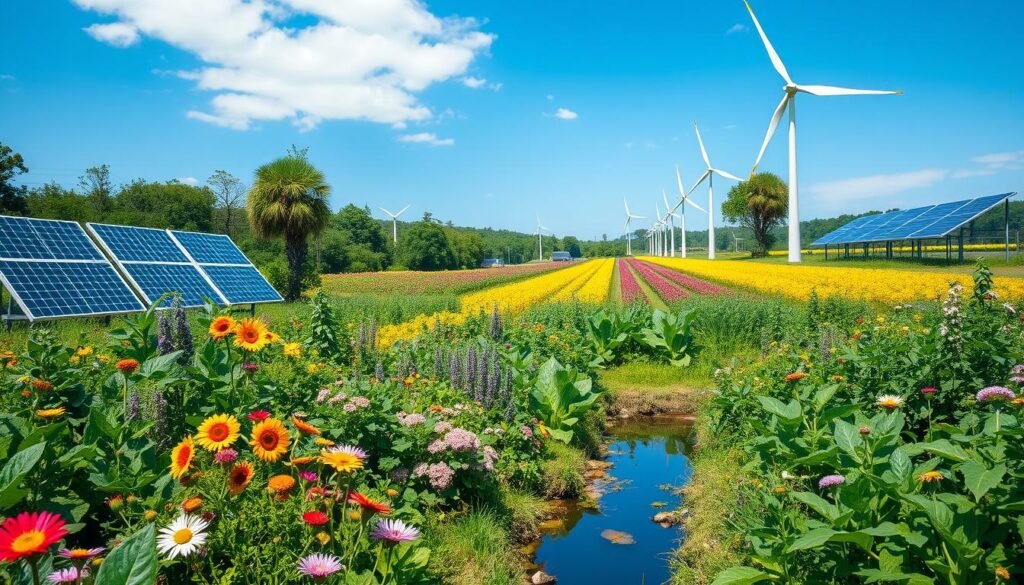
“Organic farming is not only better for the environment, but it also produces foods that are more nutrient-dense and free from harmful chemicals.”
Nutritional Benefits of Organic Foods vs. Conventional Options
The debate on organic vs. conventional foods has been ongoing. Recent studies show organic produce has more antioxidants, essential nutrients, and less pesticides.
Higher Antioxidant Levels in Organic Produce
Organic fruits and veggies have more antioxidants like polyphenols and flavonoids. These help fight free radicals and boost health. A study in the British Journal of Nutrition found organic crops have 20-40% more antioxidants than conventional ones.
Essential Nutrients and Mineral Content
Organic foods have more vitamins, minerals, and nutrients than conventional ones. For instance, organic tomatoes have up to 30% more vitamin C. Organic milk and meat also have more omega-3 fatty acids.
Lower Pesticide Residues
Choosing organic foods means less exposure to synthetic pesticides. Studies show organic produce has 30-50% fewer pesticide residues than conventional foods. This is key for those wanting to avoid harmful chemicals.
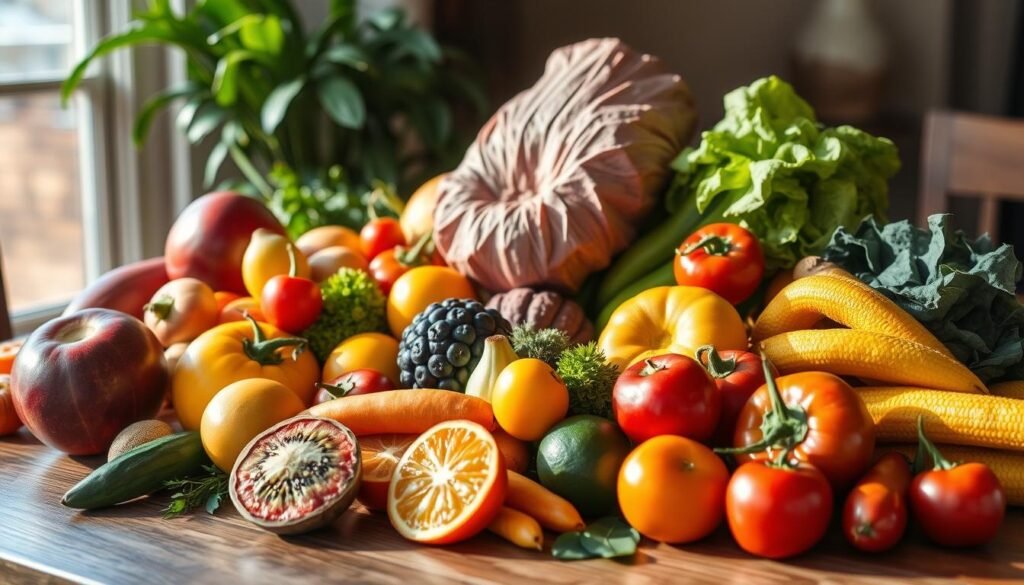
| Nutrient | Organic | Conventional |
|---|---|---|
| Antioxidants | 20-40% higher | Lower |
| Vitamin C | Up to 30% more | Lower |
| Omega-3 Fatty Acids | Higher levels | Lower levels |
| Pesticide Residues | 30-50% fewer | Higher |
Choosing organic whole foods and natural produce offers big nutritional benefits. It’s a great choice for those looking to improve their health and well-being.
How Sustainable Agriculture Supports Better Food Quality
Sustainable agriculture is key to making food that’s good for the planet and our health. It uses eco-friendly farming to make crops full of nutrients and free from harmful chemicals.
Improving soil fertility is a big way sustainable agriculture boosts food quality. Organic farming, like crop rotation and natural fertilizers, adds vital nutrients to the soil. This makes our food richer in vitamins, minerals, and other good stuff.
- Sustainable farming practices like cover cropping and composting increase soil organic matter, improving water retention and nutrient cycling.
- Natural pest management techniques, such as the introduction of beneficial insects, reduce the need for synthetic pesticides, leading to lower chemical residues in the final products.
- Diversified crop rotations and polyculture systems promote the natural balance of ecosystems, supporting a healthier environment for plant growth and biodiversity.
By using sustainable agriculture methods, farmers can grow top-notch, eco-friendly foods. These foods are not only good for the planet but also more nutritious and safe for us to eat. This approach to farming is the base for a healthier, more sustainable food system.
“Sustainable agriculture is not just about growing food; it’s about nourishing the land, the people, and the planet.”
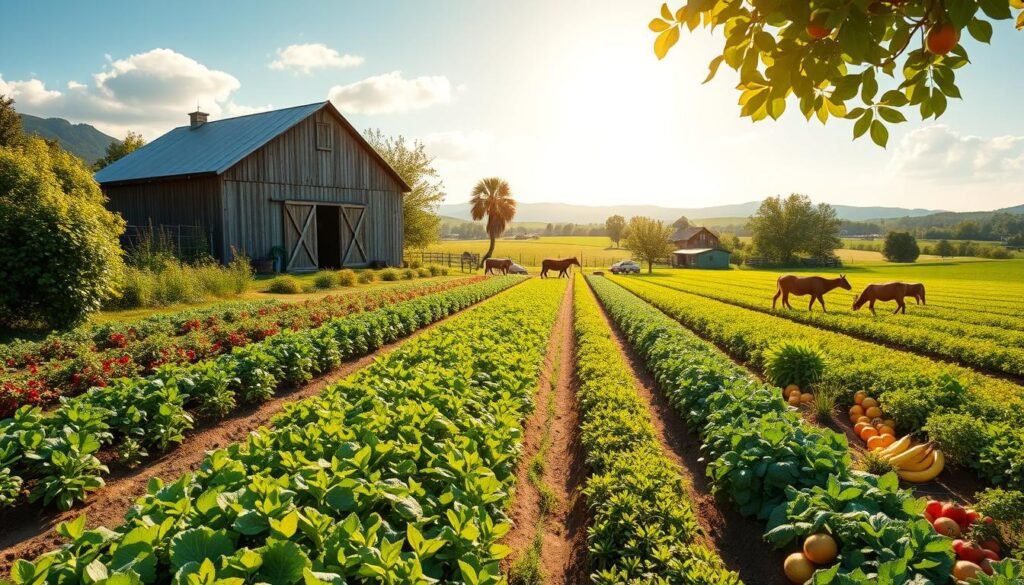
| Conventional Agriculture | Sustainable Agriculture |
|---|---|
| Reliance on synthetic fertilizers and pesticides | Emphasis on natural soil fertility and pest management |
| Monoculture crop systems | Diverse crop rotations and polyculture systems |
| High energy and resource consumption | Reduced energy and resource use, closing nutrient loops |
| Focus on maximum yield and profit | Balanced approach to productivity and environmental stewardship |
The Connection Between Organic Foods and Personal Health
Choosing chemical-free crops and pesticide-free produce can greatly improve your health. Organic foods reduce your exposure to harmful chemicals. This can boost your immune system and long-term health.
Reduced Exposure to Harmful Chemicals
Conventional farming uses synthetic pesticides and fertilizers. These chemicals can harm our health. Organic farming uses natural methods to grow crops, making them chemical-free.
Benefits for Immune System Function
Eating pesticide-free produce can strengthen your immune system. Organic foods have more antioxidants and plant compounds. These can help fight off illnesses and diseases.
“Choosing organic foods is not just about personal health – it’s also about supporting a sustainable and environmentally-conscious food system.” – Jane Doe, Nutrition Expert
Eating more chemical-free crops and pesticide-free produce can greatly benefit your health. Switching to organic reduces harmful chemical exposure. It also supports your immune system and overall health.
Why Farm-to-Table Movement Promotes Organic Choices
The farm-to-table movement is growing fast. It encourages people to eat food that’s locally grown and organic. This change is good for our health and the planet.
Supporting local organic farmers is key in this movement. Eating food from nearby farms cuts down on transportation pollution. It also means fresher, better-tasting meals. Plus, local food sources follow strict farm-to-table movement rules. This means less harmful chemicals and additives in our food.
“Choosing organic, locally-sourced food not only nourishes our bodies, but it also nourishes the land and the communities that produce it.”
Organic farming is central to the farm-to-table movement. It focuses on being green and caring for the earth. Organic farmers use natural methods instead of chemicals. This makes food healthier and tastes better, while also reducing environmental harm.
| Benefit | Description |
|---|---|
| Reduced Environmental Impact | Organic farming practices minimize the use of synthetic chemicals, which can pollute local ecosystems and contribute to climate change. |
| Increased Nutritional Value | Organic foods are often higher in essential vitamins, minerals, and antioxidants compared to conventionally grown options. |
| Support for Local Economies | Buying from local, organic farmers helps to strengthen community food systems and support sustainable livelihoods. |
By choosing organic, locally-sourced foods, we help make our food system better. This choice is good for our health and the planet. It also helps local communities thrive.
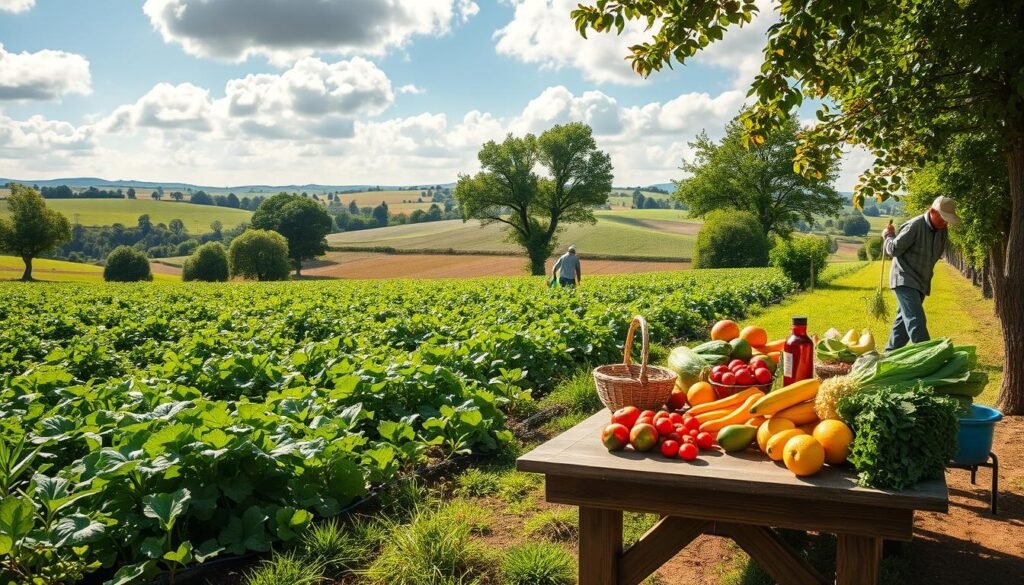
Understanding the True Cost of Organic Foods
Buying organic foods might seem pricey at first. But, looking closer shows their real value. Choosing organic is a smart move for your health and the planet.
Long-term Health Investment Benefits
Organic foods don’t have synthetic pesticides or harmful chemicals. This means less toxic stuff in your body. Eating more organic can help you stay healthy and might even save you money on doctor visits later.
Price Comparison with Conventional Foods
- Organic produce may cost 20-50% more than conventionally grown fruits and vegetables.
- Organic dairy and meat products can be 50-100% higher in price compared to their non-organic counterparts.
- However, the improved nutritional profile and reduced pesticide exposure of organic foods often justify the higher price point.
- When considering the long-term health benefits and environmental impact, the true cost of organic foods becomes more apparent.
| Product | Organic Price | Conventional Price | Price Difference |
|---|---|---|---|
| Apples (per lb) | $3.49 | $2.29 | +52% |
| Chicken (per lb) | $4.99 | $3.29 | +51% |
| Milk (per gallon) | $5.79 | $3.99 | +45% |
Knowing the real cost of organic foods helps you make better choices. It’s about your health, supporting green farming, and a better future for everyone.
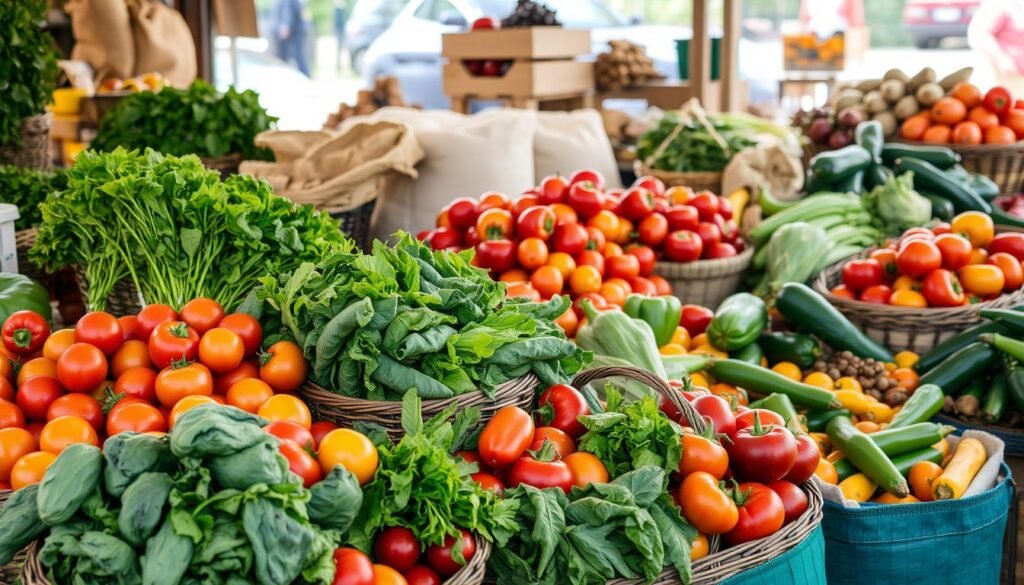
Seasonal Eating and Organic Food Choices
Embracing seasonal eating lets you enjoy more local food sources and natural produce. It means you get the best taste and nutrition from organic fruits and veggies. This is because they’re picked when they’re at their peak.
Seasonal eating also helps your local farmers. By choosing organic produce grown nearby, you cut down on carbon emissions. You also support your local food system, making it stronger and fairer for everyone.
- Enjoy the vibrant flavors and exceptional quality of organic produce at its seasonal peak.
- Reduce your environmental impact by minimizing the distance your food travels from farm to table.
- Contribute to the thriving of local natural produce growers and the preservation of precious farmland.
By choosing organic, locally sourced foods, you nourish your body. You also help the planet. It’s good for you and your community.
“Eating seasonally connects us to the natural world and the cycles of the earth. It’s a way of life that nourishes both body and soul.”
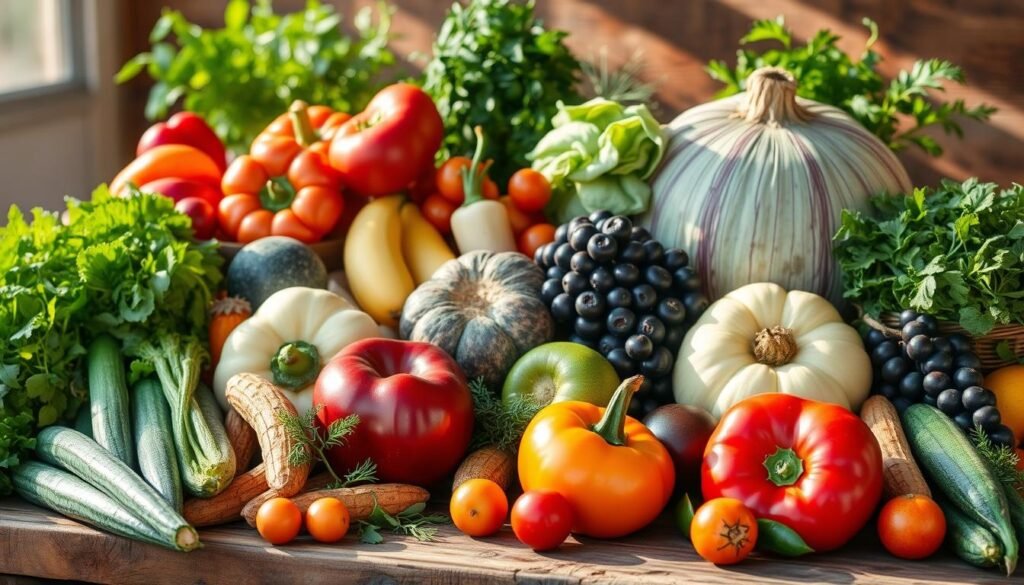
How to Transition to an Organic Diet
Switching to an organic diet might seem hard, but it’s easier than you think. Start by choosing what to buy first. Focus on the most important items.
Starting with the “Dirty Dozen”
The “Dirty Dozen” is a great guide for organic foods. It shows you which fruits and veggies have the most pesticides. Buying these items organic can help you avoid harmful chemicals.
- Strawberries
- Spinach
- Kale
- Nectarines
- Apples
- Grapes
- Bell Peppers
- Cherries
- Peaches
- Pears
- Celery
- Tomatoes
Budget-Friendly Organic Shopping Tips
Organic foods can seem pricey, but there are ways to save. Here are some tips:
- Buy in-season and local: This is cheaper and supports your community.
- Opt for frozen: Frozen organic foods are just as good as fresh and save money.
- Shop the sales: Look for organic deals at stores and markets.
- Grow your own: Start a garden to get fresh, organic food cheaply.
With these tips, you can slowly start eating organic. You’ll enjoy better health and help the planet.
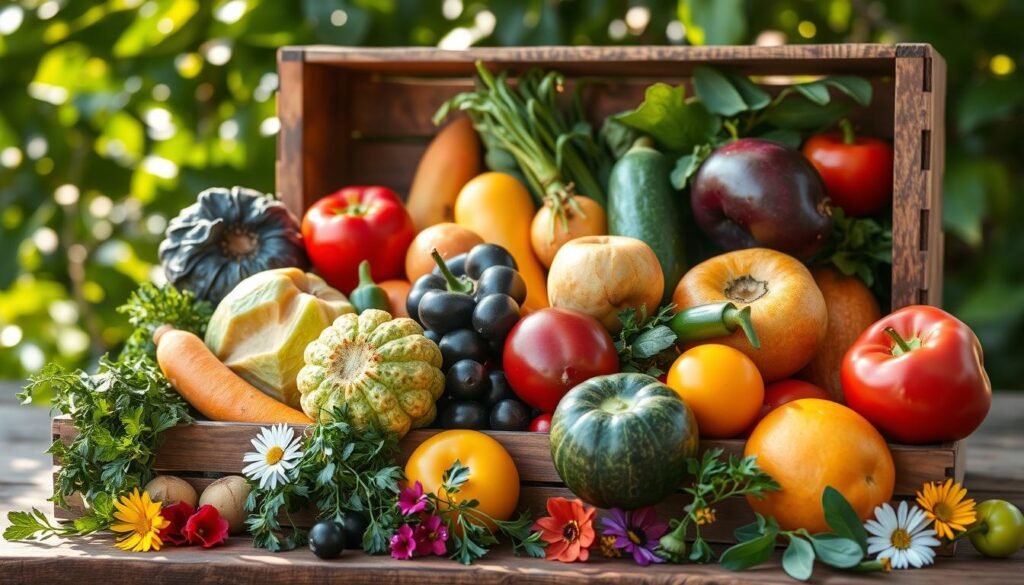
The Role of Local Food Sources in Organic Living
Organic living is more than just what you eat. It’s about supporting a food system that values quality, transparency, and care for the environment. One great way to do this is by using local food sources. This includes community-supported agriculture (CSA) programs, farmers’ markets, and local organic farms.
Choosing local food means you get the freshest, most nutritious organic produce. It also helps create a stronger, greener food system. Local farms often use methods that are good for the planet and help nature thrive.
The farm-to-table movement helps us understand where our food comes from. It builds community and lets us make better choices about what we eat. By backing local organic farmers, you feed your body and support your local food system’s future.
FAQ
What is the difference between organic and natural foods?
“Organic” means the food was made without synthetic stuff. This includes no pesticides, fertilizers, or GMOs. “Natural” foods have no artificial ingredients but might not be organic.
What are the organic certification standards?
The USDA sets rules for organic food. Farms must avoid synthetic chemicals and use sustainable practices. They also need to keep soil healthy and promote biodiversity.
How does organic farming benefit the environment?
Organic farming is better for the planet. It doesn’t use harmful chemicals that can pollute soil and water. Organic farms also help keep biodiversity alive and fight climate change.
What are the nutritional benefits of organic foods?
Organic foods are often more nutritious. They have more antioxidants and minerals than non-organic foods. Plus, they have fewer pesticides, which is good for your health.
How do sustainable farming practices improve food quality?
Sustainable farming makes food better. Practices like crop rotation and natural pest control keep soil healthy. This leads to food that’s full of nutrients and tastes great.
How can organic foods support personal health?
Organic foods are better for you. They have fewer chemicals, which helps your immune system. This can lower the risk of health problems and make you feel better overall.
What are the benefits of the farm-to-table movement for organic food choices?
The farm-to-table movement helps local farmers. It also makes food fresher and cuts down on transportation pollution. Buying local organic food supports the community and the environment.
Is organic food more expensive than conventional options?
Organic food might cost more upfront. But, it’s healthier and better for the planet. You can save money by choosing the “Dirty Dozen” organic produce.
How can I transition to an organic diet?
Start with the “Dirty Dozen” produce. Buy those items organic. Then, add more organic foods to your diet. Use seasonal and local options to save money.
What are the benefits of supporting local organic food sources?
Buying from local farms helps the environment. It also supports sustainable agriculture and local farmers. Plus, you get fresher, better-tasting food.

Hello, I’m Jimmy, founder of Jimmy Cozy Life. I’m here to help you create a home that feels warm, stylish, and balanced. With ideas for decor, celebrations, wellness, and DIY projects, my goal is to share practical tips and a bit of inspiration to make your space truly special.
Disclosure: This post contains affiliate links. If you click and make a purchase, we may receive a small commission at no extra cost to you. The content on this website was developed with assistance from AI.



